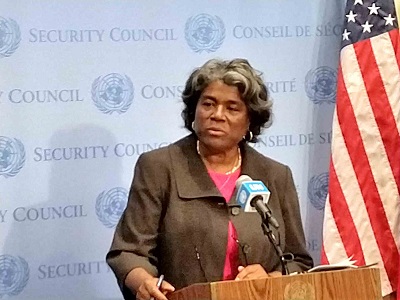United Nations, (Asian independent) Food security and human rights will be top priorities for the US presidency of the UN Security Council (UNSC) this month, according to Permanent Representative Linda Thomas-Greenfield.
“Food should never be used as a weapon of war,” she said on Tuesday in a criticism of Russia for torpedoing the UN-sponsored initiative to export agricultural products from Ukraine and endangering global supplies.
To put the spotlight on the looming food problem, Secretary of State Antony Blinken will chair a high-level open debate on famine and conflict-induced global food insecurity, she said.
He will be coming with concrete proposals, Thomas-Greenfield said and asked all UN members “to stand with us in combating food insecurity by signing our draft communique”.
“We know food security is national security, and we know without a shadow of a doubt it is within our power to feed the world and end famine. Addressing famine and food insecurity, is deeply personal to me. I’ve seen firsthand what happens to people who have hunger thrust upon them.”
She, however, said that Russia was likely to return to the Black Sea Grain Initiative from which it had withdrawn last month.
“We have been told is that they are prepared to return to discussions, and we haven’t seen any evidence of that yet,” the Permanent Representative said, adding that the motivation would be that they need the deal if they want to export fertilisers and be paid for it.
Under the programme sponsored by the UN with Turkey’s cooperation, Russia agreed to allow Ukraine to send agricultural products through the Black Sea.
Ukraine has emerged as the world’s bread basket with its exports accounting for about 10 per cent of the global wheat trade.
When exports from it and Russia were disrupted after Moscow invaded Ukraine, the price of foodgrains shot up and several developing countries faced severe food shortages and the gain initiative mitigated the situation.
The US emphasis on food security would draw the attention of developing countries, especially those in Africa, to Russia’s role in again disrupting global agriculture supplies.
“Our second area of focus is the protection of human rights and fundamental freedoms around the world,” Thomas-Greenfield said.
“As we approach the 75th anniversary of the Universal Declaration of Human Rights, we will integrate human rights into this month’s Council agenda.”
She has scheduled a meeting on threats from terrorism on August 25.
In a development unprecedented in at least recent times, the programme of work set out by the month’s president was challenged by a member.
Russia’s confrontation with the US, an enduring feature of the Council business, came to the fore when Moscow openly disagreed with the programme designed by Washington.
Russia’s Deputy Permanent Representative Dmitry Polyanskiy said his country objected to holding three meetings on Syria and that the meeting on Ukraine is “overstepping our redline”.
Since veto powers do not cover procedural matters, Russia’s objections did not block the programme. Thomas-Greenfield called it “a little stunt” that will not interfere with how the US carrying out its work as president.








